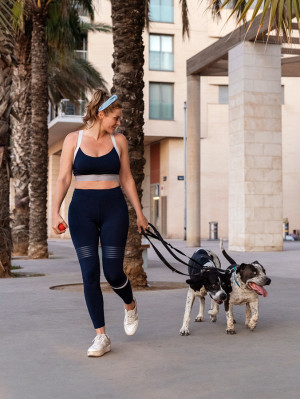Is Gen Z Shopping for Dogs Instead of Adopting Because of Social Media?
Shelters are overflowing. One shelter volunteer tells us Gen Z is to blame, but is this true?

Share Article
“Gen Z prefers purebred dogs over rescues,” said my elder millennial friend, Alice, with thinly veiled contempt.
“What do you mean?” I, also an elder millennial, asked.

littleKin™ is Kinship’s home just for puppy and kitten parents. Bop over to check out expert advice, new pet tools, and special deals—all curated for your newest family member.
opens in a new tab“They are being influenced by social media to buy purebred dogs from breeders, rather than adopting from shelters,” she said.
“How do you know that?” I asked, unwilling to take her statement at face value, though she is an animal-rights activist, dog foster mom, and shelter volunteer who is extremely concerned about the overcrowding of many municipal shelters.
“It’s obvious,” she insisted. “You should look into it.”
So, I did. Not because I thought there was any merit to it, but because I suspected that this was another example of millennials maligning Gen Z, the same way we were maligned by the boomers and Gen Xers who came before us. And I thought maybe, just maybe, I could debunk it.
Editor’s note: The names in this story have been changed for anonymity.
Does Gen Z really shop more than they adopt?
To start, I asked a few Gen Z acquaintances about their preferences. Gen Z is between the ages of 12 and 27, so many of them are still too young to have a dog or cat of their own. Rather, they have a family pet who was procured by their parents. Such is the case with Lily, 22, whose family has a Shepherd mix they adopted from a shelter, although the family’s first dog was a Black Lab from a breeder. “I feel that it is more ethical to adopt your dog from a rescue,” she says. “But I understand why some people choose breeders. My family hadn’t owned a dog before our Lab, so a breeder was the best choice [for them] then. After having a dog for many years, when we decided to get our second, we went to a rescue.”
Lily feels fairly certain that when she does get a dog of her own, she will adopt. What’s more, she says that if she had to guess, she would say most of her generational peers would probably do the same. “I think I am probably in the majority, as I know the ‘adopt don’t shop’ effort is a more recent thing.”
Monroe, 26, also feels fairly certain that he will adopt when the time comes. “I think I’d choose a shelter for the convenience and affordability,” he says. “And for humanitarian reasons.”
That said, his former roommate, James, 25, got his dog from a breeder. “It was his first dog, and it was during the pandemicopens in a new tab, when I think a lot of people were getting dogs,” Monroe adds. “But then he started going into the office more, and he got a boyfriend and he ended up giving the dog back to the breeder after a couple of years because he didn’t want to take care of it anymore. The dog was adopted, apparently, but he probably shouldn’t have got her in the first place.”
Monroe doesn’t know what inspired James to go the purebred route, and James declined to be interviewed, but he suspects that James and many other Gen Z dog parents choose breeders because they see dogs as accessories rather than long-term responsibilities. “Especially here in New York, I think they see a dog as something akin to a piece of designer clothing,” he says.
Monroe admits to feeling the influence of social media. “My roommate’s dog was a Corgi, and soon the algorithm was showing me all these Corgi videos,” he says, “which definitely made me think about them more and how cute they are. So it’s possible that if I decided to get a Corgi, I would just go to a breeder.”
Sarah, 27, paid $5,000 for a purebred Poodle two years ago. “I always wanted a Standard Poodle, and you just don’t see them in shelters that often,” she says. “Not that I looked that hard, if I’m being honest. Some people probably judge me for spending so much on a dog when there are so many in shelters, but my grandmother had a Standard, and I wanted one, too, so I got it and I don’t think I should be made to feel bad about that.”
Sarah doesn’t believe that her decision was influenced by social media, but she admits to consuming a lot of Poodle content on TiKTok and says she often buys dog toys and accessories after first seeing them on in ads on her accounts. “That’s just how people my age shop,” she says.
That’s certainly true when it comes to pet-related products, according to the American Pet Products Associationopens in a new tab (APPA), a representative of which told me that “social media is key in driving awareness for new pet products among the younger two generations: 55 percent of Gen Z and 49 percent of millennial pet owners become aware of new pet products on social media. In fact, social media is the top resource for Gen Z to learn about new pet products.”
But just because they use social media to find out about new pet products doesn’t necessarily mean they are using it to make decisions about which pet to adopt and from where. And if they are, well, according to the APPA’s findings, millennials are nearly as likely as Gen Z to learn about new pet products on social media. So, if Gen Z folks are being influenced by their algorithms to buy breeder dogs, it’s reasonable to assume that those of a generation older than them are, too.
Either way, it would be irresponsible to characterize all of Gen Z based on the few Zoomers I was able to interview. So, I looked around online for some statistics on Gen Z’s attitudes towards breeder versus shelter dogs — studies, data, academic papers. But I couldn't find anything that wasn’t just anecdotal.
Are breeders really seeing a higher Gen Z client base?
So, I reached out to over 20 dog breeders, asking if they would share information with me about their client demographics. I also reached out to the American Kennel Club (AKC), hoping they might be willing to help me out — I never heard from them. Only two independent breeders got back to me, both of whom said that the majority of their clients are older than Gen Z and that no one has ever come to them saying they want a specific breed of dog because of social media. In fact, Laura and Oscar Hoyt of Puglicious Cuddle Pugs in Greenville, South Carolina, said the only media that has ever been referenced to them by someone looking to adopt one of their Pugs was Men in Black, which, let’s be honest, sounds like a millennial.
These breeders did acknowledge the power of social media, but they voiced concerns over the way that Meta, Google, and other companies promote bad actors in the dog-breeding world in order to satisfy the demands of their algorithms. The breeders I talked to also said they had not noticed any demographic shifts since COVID. So, if Gen Z does prefer breeder dogs over rescue dogs, as my friend Alice believes, it would seem that this is not a recent phenomenon.
Then again, in 2020, when the pandemic began, the oldest members of Gen Z were just 23 years old, so the vast majority of them were not in a position to have a dog of their own, purebred or otherwise. If indeed there is a demographic preference one way or the other, I suspect that even now, when a third of Gen Z is still under 18, it would be hard to measure.
Even so, I decided to reach out to the ASPCA,opens in a new tab which partners and collaborates with hundreds of local shelters and rescues across the country, in the hope that they might have some data to share. But Christa Chadwick, vice president of shelter services, told me they “don’t have hard data on these demographic divides.”
She did point out, however, that just because someone adopts from the shelter doesn’t necessarily mean they don’t want a very specific, even purebred, pet. “Many people have a strong personal preference when it comes to dog breeds,” she said, “whether it’s based purely on looks, a breed’s reputation, or nostalgia for a favorite childhood pet.”
As Kinship has reportedopens in a new tab, 25 percent of dogs in shelters are purebreds, and websites like Adopt a Petopens in a new tab allow you to filter by breed within the larger shelter system. I’m a cat person myself and found my last two cats on a national database filtered to show me only long-haired males over 10 years old. That said, “breeder versus rescue” is just one of many preferences that a person of any generation might take into account when searching for a pet.
If there’s any truth to this, what does capitalism have to do with it?
If Gen Z does prefer breeder pets to shelter pets, I would expect marketers to have figured it out by now and be using this information to sell to them, but that doesn’t seem to be the case. Per Colleen Wilson, founder of Pets on Qopens in a new tab — a pet talent agency representing some of the world’s most popular pet influencers — brands are much more interested in an animal’s story than whether or not they are from a breeder. “I think in 10 years of doing this, I’ve received a request to work specifically with breeder-bought animals only once or twice,” she says. That’s not to say that marketers don’t favor the aesthetics of one breed over another to sell certain products, but even so, she says, they are unlikely to specify a purebred over a rescue.
This is even more true when it comes to marketers looking to work with celebrity cats, says Pearl Frazier, a cat breeder and cat talent manager at Cat of Fameopens in a new tab. “Most companies do not care if the cat is purebred or rescue unless they want a specific look or want to run a campaign with a rescue cat message,” she says. “For instance, there is a brand that prefers to work with Russian Blues because that’s their mascot. But I’ve also had multiple brands state that they want creators with rescue cats because they want to fundraise for shelters as well.”
As a cat breeder, Frazier says most of her clients fall between the ages of 30 and 50 (millennials and Gen X), but suspects the reason has more to do with the price of purebred cats than any particular generational preference. Indeed, the price of purebred animals in general would seem to preclude most teens and 20-somethings.
Until proper scientific demographic research is done, we can’t really say for sure one way or the other if Gen Z prefers purebreds or not. Like those in the generations before them, some do and some don’t. Social media is certainly a powerful influence these days, but the algorithms that populate our feeds are designed to show us what we want to see. If a person only interacts with Corgi videos, they are going to see more Corgi videos. Does seeing those videos mean they are more likely to want a Corgi and contact a breeder to get one? Maybe. But if that is true, I suspect it is true for millennials and Gen Z alike.
But either way, educating people about how to be responsible pet parents is ultimately more important to the welfare of all animals than policing where people get their pets in the first place. And if a millennial wants to encourage Gen Z to adopt from shelters, which I suspect is what really prompted my friend Alice to bring this idea up to me in the first place, they’d be more likely to succeed if they treated them with the same respect, consideration, and empathy they wanted for themselves at their age. They should remember that people seek out pets because they have love to give, and that is always a good thing.
References:
Shaping the Future of the Pet Business Communityopens in a new tab

Charles Manning
Charles Manning is an actor, writer, and fashion/media consultant living in New York City with his two cats, Pumpkin and Bear. Follow him on Instagram @charlesemanningopens in a new tab.
Related articles
![Dog standing in an animal shelter]() opens in a new tab
opens in a new tab“Should I Adopt an Adult Rescue Dog?”
Yes! Shelters are full of good, grown-up doggos. Here’s how to find the perfect match.
![anonymous woman pampering and taking care about a small ginger kitten]() opens in a new tab
opens in a new tab6 Ways to Help Local Shelters Without Committing to Full-Time Pet Parenthood
Learn how you can be there for animals in need this National Pet Day.
![A dog running with a woman on a pier.]() opens in a new tab
opens in a new tab8 Questions to Ask Yourself When Choosing a Dog Breed
Find out which dog breed is right for your lifestyle.
![An angry looking cat hiding under a couch.]() opens in a new tab
opens in a new tabWhy You Should Not Get a Puppy on Craigslist
Puppy mills and animal traffickers are tricking Craigslist users into purchasing dangerously — sometimes terminally — sick dogs.
![tripod dog / dog with three legs]() opens in a new tab
opens in a new tabWhy You Should Adopt a “Less Adoptable” Dog
Here’s why you shouldn’t rule out senior dogs, special-needs pups, bully breeds, or tripods.
![Woman In Sportswear Walking With Two Dogs On The Street.]() opens in a new tab
opens in a new tabWhat’s Stopping You From Fostering a Pet?
Here are six very good reasons why you should reconsider.









